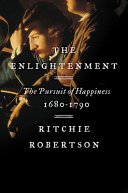Top of the pile
81
/100
I Index Overall Rating

Readers
Critics
Scholars
Author:
Ritchie Robertson
Publisher:
Harper
Date:
February 23, 2021
A history that recasts the Enlightenment as a period not solely consumed with rationale and reason, but rather as a pursuit of practical means to achieve greater human happiness.
What The Reviewers Say
Jane O\\\'Grady,
The Times Literary Supplement (UK)
The Times Literary Supplement (UK)
What is called 'the age of reason' should properly be considered 'the age of feeling, sympathy and sensibility', argues Robertson. The opposition between reason and tradition, which was crucial to the Enlightenment, has been conflated with an opposition between reason and emotion, which was not. These are fairly standard points, as is highlighting the role of 'sensibility' in Enlightenment ethics, and how Francis Hutcheson, Lord Shaftesbury and David Hume variously argued that emotion, rather than reason, was, and should be, both the spur to, and the foundation for, moral behaviour. More original is Robertson’s fine-grained portrayal of how both reason and emotion were recalibrated in the Enlightenment..
Cullen Murphy,
Airmail
Airmail
There’s a certain kind of book that defies a direct approach. It arrives on the doorstep, several inches thick, dense with learning.
Jesse Norman,
The Spectator (UK)
The Spectator (UK)
...the general reader can be forgiven for feeling a tad daunted. Now, however, help is at hand, in the form of The Enlightenment: The Pursuit of Happiness, 1680-1790 by Ritchie Robertson, a work that is at once readable, authoritative and wide-ranging.
Steve Donoghue,
The Christian Science Monitor
The Christian Science Monitor
... deeply impressive.
















